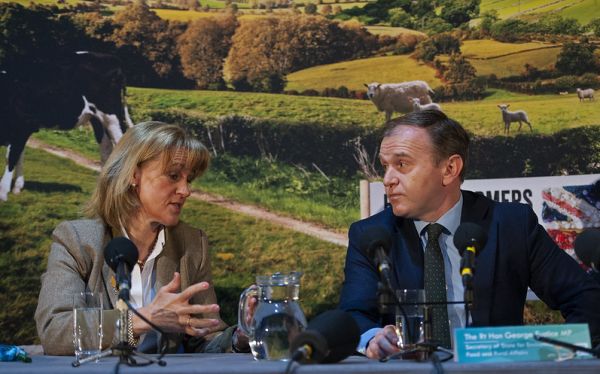
Written by Alistair Driver
How NFU president Minette Batters piled the pressure on new Defra Secretary George Eustice as debate over import standards dominated the recent NFU Conference
George Eustice was unable to provide the assurances demanded of him, as NFU president Minette Batters upped the ante on post-Brexit food import standards during a storming performance at the NFU Conference, in Birmingham.
Mrs Batters warned Boris Johnson in her main conference speech that ‘to sign up to a trade deal which results in opening our ports, shelves and fridges to food which would be illegal to produce here would not only be morally bankrupt, it would be the work of the insane’.
She then put Mr Eustice on the spot in front of more than 1,400 people and the glare of the national media, pointing out that during his brief time as a backbencher last year, he tabled various amendments that would deliver what the UK farming industry is now asking for. That is to enshrine the Government’s commitment to maintain UK food standards in future trade deals through legislation requiring food imports to meet UK standards.
“I am very confident that when the Agriculture Bill passes to House of Lords, this amendment will be put down,” Mrs Batters said. “Can we have assurances that when that amendment comes back into the Commons, it will not be taken out?”

Mr Eustice said he would ‘have discussions’ with other departments about maintaining our standards in trade deals.
Government trade ambitions
The Government has made it clear that, under a new EU trade deal from 2021, it wants ‘control of its own laws’ and freedom to enter ambitious trade deals with other countries. This puts it at odds with the EU, which says the UK should remain aligned with EU rules, including on food and environmental standards.
Mr Johnson has also made it clear the UK would walk away from negotiations with the EU as early as June if a ‘broad outline’ of a deal was not in place, raising the prospect of a radically different trading environment from the start of next year, possibly governed by WTO rules.
This would present huge challenges in maintaining standards. For example, US Government officials and industry representatives have repeatedly stressed that a pre-condition of any future deal with the UK is that we scrap what they see as unscientific and politically-driven EU restrictions on practices like chlorine-washed chicken.
Since the conference, the Department for International Trade also published a document laying out the Government’s ambitions for a future US trade deal.
It sets out the ‘best of both worlds’ approach seeking to ‘reduce technical barriers to trade by
removing and preventing trade-restrictive measures in goods markets, while upholding the safety and quality of products on the UK market’. This includes ‘promoting the use of international standards, to further facilitate trade between the parties’.
The document adds: “The UK’s reputation for high quality food and agricultural products is recognised internationally and underpins our exports of these products.
“Any trade agreement with the US must work for UK consumers, farmers and companies and the Government will strongly defend our right to regulate in these areas in the public interest. The Government’s manifesto has made it clear that ‘in all of our trade negotiations, we will not compromise on our high environmental protection, animal welfare and food standards’.”
But it does not state how the Government will ensure UK standards are not compromised.
‘Not extraordinary’

Few were convinced, including Mrs Batters, who bemoaned what see sees ‘as a total lack of agreement in Government about the way forward in this area’.
“This will test the moral compass of the Government. That amendment has to stay in and, if it is taken out, we will know the road we are on. My worry is that we are talking a lot about raising the bar for UK farmers when we have no assurances on the standard of food imports. That does one thing – it puts these guys out of business,” she said.
Mrs Batters stressed that the issue went way beyond chlorine-washed chicken. She highlighted the gulf between UK standards and those in various other countries, for example, the use of antibiotics as growth promoters in Japan, Australia, China, Canada, Brazil, Malaysia and India and the lack of controls in the US and elsewhere ‘on what are deemed in the UK to be fundamental welfare requirements’.
Get Our E-Newsletter - breaking news to your in-box twice a week
See e-newsletter example
Will be used in accordance with our Privacy Policy
Continue reading on the Farm Business Website...





